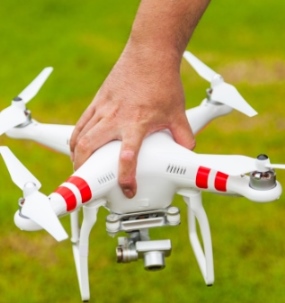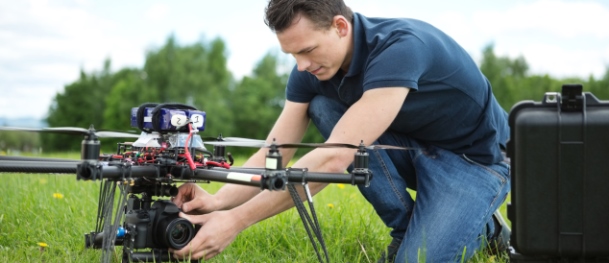Commercial Drones: When Tech Flies Faster Than the Speed of Government
Business & Environmental Litigation Attorney
by Stephen T. Holzer
818.907.3299
Unmanned Aircraft Systems (UAS), or drones as they are more commonly known, are under intense scrutiny by the Federal Aviation Administration (FAA). In fact, the FAA itself is under scrutiny, by big and small businesses alike.

In February, the agency published a Notice of Proposed Rulemaking (NPRM) to amend regulations governing drone operators and their craft.
Under the proposed rules for UAS weighing less than 55 pounds, operators must maintain visual contact with the craft at all times, fly drones between sunrise and sunset only, and not over the heads of people who are not directly involved in the drone’s operation. Drones can’t exceed 100 mph or fly higher than 500 feet, and operators will need to perform a pre-flight check of their craft to ensure safety.
In late March the FAA announced plans to grant Certificates of Waiver or Authorization (COA) which usually applies to research endeavors. Business can also apply for Section 333 Petitions of the FAA Modernization and Reform Act of 2012 – for certain commercial drone operators flying UAS under 200 feet and specified distances away from airports.
Section 333 petitions allow the Secretary of Transportation to grant on a case by case basis, an operator authorization to fly a drone without the normally required mandates of a registered aircraft, licensed pilot and operational approval.
According to Fortune Magazine, the FAA is not exactly free-flying in this endeavor. First, the agency is undermanned with a crew of 10. Additionally, the FAA feels it must scrutinize each highly complicated exemption individually – they’ve received over 600 petitions, and approved about 10 percent so far.
The FAA in response to criticism over its original NPRM revealed in February cited the complexity of the issue, and that there are no technology standards for drones established yet.
This week, American International Group (AIG) announced the FAA granted approval for the insurer to use drones when surveying disaster areas. AIG says they will use UAS to better assess risk and help clients rebuild after catastrophic events.
It sounds like the FAA may be more ready to launch forward in allowing commercial drone use, but this still may not be good enough for Amazon.
In a recent congressional hearing, the online retailer’s Vice President for Global Public Policy complained the U.S. is falling behind on the flight path:
Nowhere outside of the United States have we been required to wait more than one or two months to begin testing…What the FAA needs is impetus, lest the United States fall further behind.
Additionally, Amazon claims that the drones the FAA has authorized for test flights are already obsolete. Amazon developed newer and better models, which they are now testing overseas.
In Europe, the outlook for commercial drone use has broader horizons. DHL has begun dropping off supplies to an island 12 kilometers from Germany’s coast – the first service exceeding visual line of sight delivery, according to The Economist. Some law enforcement agencies in the UK plan to use drones to fight crime, according to engadget.com.
California Drone Laws Address Privacy Concerns
Closer to home, most of the fight for drone flights in commercial use remains at the federal level. California seems to be flying a different legal path.

The drone industry could potentially pump billions into the California economy, according to trade groups. But many in the state are more worried about privacy and safety, e.g., the drone that crashed on White House grounds in January.
Last September, Governor Jerry Brown approved an amendment to Civil Code §1708.8, which should clip the wings of the paparazzi and anyone else intending to use UAS to invade the privacy of an individual in personal or family settings: “…through the use of any device, regardless of whether there is a physical trespass….”
Governor Brown vetoed Assembly Bill 1327 for being too restrictive for police. The proposed bill prohibited the use of UAS by public agencies, except by law enforcement under very specific circumstances (usually requiring a warrant), or to aid first responders in traffic accidents or in natural and environmental disasters.
So far, California has two other assembly bills up for debate this year also focused on law enforcement use and privacy: AB 37 and Ab 56. Assemblywoman Marie Waldron, R-Escondido, introduced AB 14 addressing a need for a task force to study the drone industry and regulations.
Except where privacy and business issues overlap as in the paparazzi amendment above, California isn’t quite yet on board with tackling the business aspects of drone use.
There’s already a Congressional Unmanned Systems Caucus, initially established in 2012 to study privacy issues. Congressmen Joe Heck (NV) and Daniel Lipinski (IL) have recently announced a “re-launch” to “educate members on commercial applications of unmanned systems, industry trends, and regulatory issues for air, land, sea systems”.
Hopefully, the Congressional interest and state legislation such as California’s AB 14 can move the regulatory process forward.
Stephen T. Holzer is an Environmental and Business Litigation Attorney. Contact him via email: sholzer@lewitthackman.com, or by phone: 818.907.3299.
